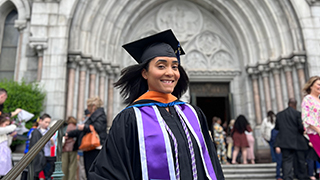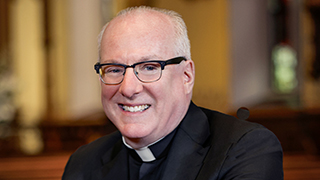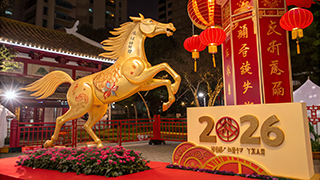“Solutions Through Solidarity, Sustainability and Science”: Seton Hall Hosts U.N. General Assembly President Csaba Kőrösi - Seton Hall University
Wednesday, February 15, 2023
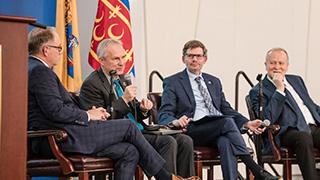
Students met with Ambassador Csaba Kőrösi at the World Leaders Forum on January 26.
Ambassador Csaba Kőrösi of Hungary, the President of the 77th United Nations General Assembly, gave a lecture at the University Center on January 26 regarding the U.N.'s prior accomplishments and future endeavors.
Kőrösi, who was elected president on June 7 of last year, was previously Hungary's Director of Environmental Sustainability. He said he went from representing one nation to 193 nations. He described his position as "neutral," as there are "193 countries with 193 sets of interests." "It's a big task," Kőrösi said. Currently, there is a "huge divide" within the U.N., he added, citing "general feelings of mistrust" and "declining willingness to find grounds on issues."
This is the second time the University has hosted a U.N. General Assembly president, the first being Miroslav Lajčák, former president of the 72nd Assembly.
"The ambassador's visit is a great gift to us all," University President Joseph Nyre said at the beginning of the lecture.
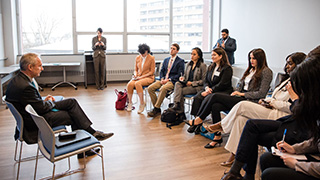
Ambassador Kőrösi took part in a candid Q&A with students from the School of Diplomacy and University press.
Kőrösi called Seton Hall a "great university" due to its combination of "high quality education" and "preserving Catholic roots."
Courtney Smith, the Dean of the School of Diplomacy and International Relations, and László Molnár, a former ambassador of Hungary to the U.N., both attended the lecture. Molnár, who is also an official visiting scholar for the 2022-23 academic year, applauded Kőrösi's "professionalism and dedication to promote a noble cause." "Without a doubt," Molnár said, Kőrösi is "the right man in the right place at the right time."
Kőrösi started the lecture off by showing the audience multiple graphs of various socio-economic and earth system trends, which have all grown exponentially over the last century. He called this "the great acceleration."
He also listed current statistics of the world today: there are 27 major conflicts throughout the world, the average global inflation rate is 9%, gas and electric prices in Europe have "jumped fifteenfold," 76 countries are about to hit financial crisis, and more than 40% of the world will face water shortages by 2040.

The guest of honor was joined on stage by President Joseph Nyre, Dean Courtney Smith and László Molnár, a former UN ambassador and a visiting scholar at the School of Diplomacy.
Despite the grim numbers, he said there is a "ray of hope," as never in history has there been "such a fast development" in science and technologies. "We have to design a new world," he said, which cannot be "done on the battlefield" but with negotiations. The U.N. is in the process of meeting and planning for 16 negotiation processes, Kőrösi said, one of them a sustainable development goals summit in September of this year.
"We are off track," he said. "We need to correct what has been done in a wrong way. If there's no sustainable future, there is no future. You don't go where the pack is, you go where the pack will be."
Prior to the lecture, Kőrösi urged those of younger generations to "speak up and join the table." He added that he occasionally holds meetings with those of Generation Z, who are "already at the table." "You need new people, new approaches," Kőrösi said.
Categories: Nation and World




